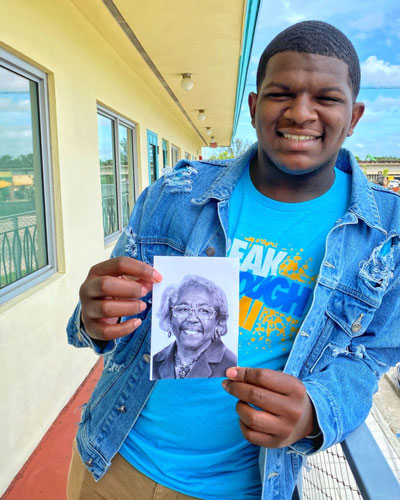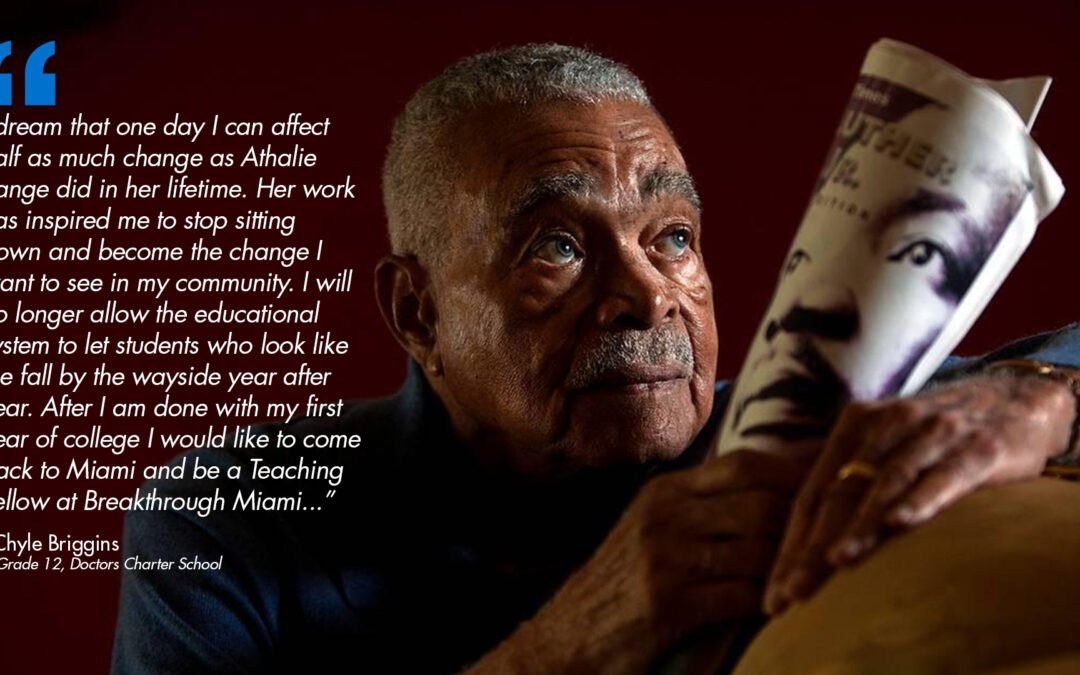Legacy
2nd Annual Black History Month Essay Contest In Honor of the late Garth C. Reeves, Sr.
Breakthrough Miami is excited to share the 2nd Annual Black History Month Essay Contest in honor of veteran, community leader, equality and civil rights activist, black press magnate, the late Garth C. Reeves, Sr.
Amidst unprecedented challenges in the midst of the pandemic, we received a record number of Scholar essay submissions this year. Forty-five Scholars worked with Directors and Support Staff to identify a local pioneer and develop a compelling narrative demonstrating their contributions to South Florida. Today, as we honor the legacy of Garth C. Reeves, Sr. and his mission to speak truth through the power and reach of one of the oldest black-owned media companies in South Florida, we celebrate our Scholars whose submissions reflect his vision, focusing on African-Americans’ Acts Of Courage And How They Shaped South Florida.
Scholars this year were encouraged to discover South Florida history, exploring African-Americans who made an impact on their community and whose stories are seldom told. The diverse subjects of their essays included great South Floridians who inspire future generations including the honoree Garth C. Reeves, Sr., Dana Albert Dorsey, Athalie Range, Dorothy Fields, Felicia Hatcher, Valencia Gunder, Benny O’ Berry, Georgia Jones Ayer, and Carl E. Yaegar.
We are pleased to announce the winners:
Elementary School Winners:
Asly Rivera, Grade 5
Santa Clara Elementary
1st Place – Agenoria Spearman Paschal the great leader!
Daira Perez, Grade 5
Tropical Elementary
2nd Place – How Olivia Love Edwards changed South Florida
Chloe Asley Gabriel, Grade 5
Tropical Elementary
3rd Place – Benjamin L. O’Berry
Middle School Winners:
Christen Voltaire, Grade 6
Devon Aire K-8 Center
1st Place – Physician and Leader – Carl E. Yaeger Jr.
Brandon Cervantes, Grade 6
Author and Polly Maze
2nd Place – M. Athalie Range
Taylor Mack, Grade 6
iPrep Academy North
3rd Place – Georgia Jones Ayers
Ana Gonzalez, Grade 7
Ransom Everglades School
1st Place – Range for Change – Athalie Range
Sheila Fernandez, Grade7
South Miami Middle School
2nd Place – My Doctor, My Hero – Dr. Tina Carroll Scott
Jonmarc Hall, Grade 7
Rainbow Christian Academy
3rd Place – Thelma Gibson
Elicia Lee, Grade 8
Ransom Everglades School
1st Place – Dorothy Jenkins Fields: History Maker of South Florida
Arthur Escoto, Grade 8
Frank C. Martin K-8
2nd Place – Dana A. Dorsey’s influence on South Florida
Zachary Rodriguez, Grade 8
Frank C. Martin K-8
3rd Place – Calvin R. Mapp Sr.
High School Winners:
Jaheim Golden, Grade 11
Young Men’s Preparatory Academy
1st Place – Dr. Enid C. Pinkney: The perseverance through the preservation
Maya Douyon, Grade 10
Coral Gables Senior High
2nd Place – Valencia Gunder
Chyle Briggins, Grade 12
Doctors Charter School
3rd Place – Marie Athalie Wilkinson
The essay contest was established to honor Dr. Reeves, publisher emeritus of The Miami Times, who passed away at 100 in late 2019. As the only job he had, aside from serving in the Army during World War II, Reeves’ energy in running the landmark black-owned paper would impact the lives of countless families in South Florida. He’d found his life’s calling — to serve as a voice for the black community. He knew no better job. Reeves, who oversaw the black-owned paper his father initially printed one page at a time on a small hand press in a modest Miami home upon its founding in 1923, and who kept it in the family as it evolved into its digital edition today, died two months after his daughter, Rachel, passed. She was the publisher of The Miami Times, assuming the mantle of leadership from her father and grandfather. (Miami Herald, November 2019) Breakthrough Miami is proud to have Regina Jolivette-Frazier, Reeves’ niece, as a long standing member of the executive committee of our board of directors.
Garth C. Reeves, Sr. is a tall tree in the forest in which his community sought salvage from the elements. His work in the publishing world and ultimately his founding of the Miami Times gave voice to countless stories otherwise untold. What’s reflected in the sentiments of our scholars in their essay entries is a resonating theme of perseverance, hard work, and justice, similar themes found in the ethos of Breakthrough Miami programming. Our scholars did a wonderful job making the connection between the lessons learned from researching their chosen pioneers and what they continue to learn as Breakthrough Miami scholars. Below, are a few excerpts from our winning essays that demonstrate just that.
Read the First Place Essays in Each Grade Level
Agenoria Spearman Paschal the great leader! - Asly Rivera, Grade 5, First place
Agenoria Spearman Paschal the great leader! – Asly Rivera, Grade 5, First place
Agenoria Spearman Paschal the great leader!
Black history month is celebrated in February . We celebrate black history month and remember all outstanding African American who have done great for America and all their achievements. Agenoria Spearman Paschal was born July 25, 1923 and she passed away on March 17, 2015. She was a native of Tallahassee, Florida. She served over 40 years at Miami-Dade County Public Schools (M-DCPS) . She followed her grandmother’s steps who was an outstanding teacher in the 1800’s. Agenoria is a great influence on why we celebrate black history month.
Without a doubt Agenoria was a marvelous woman who helped shape Florida. Agenoria served as a teacher, assistant principal, and director for Miami-Dade County Public Schools (M-DCPS) for more than 40 years until she retired. Not to mention, Agenoria obtained the Little School House Award when she served as principal at Lorah Park Elementary. Besides when she was a director she was honored by the Instituto De Cultura Hispanic of Miami Florida and she received an award from the Hispanic Teachers of Dade County Schools. Agenoria has blessed Florida with her hard work.
In other words, Agenoria was a very kind and nice person who tried to help her community. It takes courage to serve as a teacher, assistant principal, and director for over 40 years and having to take care of her family and helping her community. This seems like something someone would probably not do. In that case, this is why we celebrate black history month to honor all these great people.
Briefly to conclude, Agenoria Spearman Paschal was a great person who was always there for the community and followed her grandmother’s steps who was also an outstanding teacher in the 1800’s. Agenoria was always there to help her community and her family. Agenoria will always be a great influence. Black history month is the time we get to honor all of these great people like Agenoria for all their hard work and success.
Asly Rivera, Grade 5Santa Clara Elementary – Breakthrough MiamiScholar at Ransom Everglades School
Physician and Leader, Carl E. Yaeger Jr. - Christen Voltaire, Grade 6, First Place
Physician and Leader, Carl E. Yaeger Jr. – Christen Voltaire, Grade 6, First Place
Physician and Leader
When you think of the word impact, you think of a great change that benefited everyone, or a major event that changed the way people look at things. Well, Carl E. Yaeger Jr. did just that, he impacted South Florida and the people who lived there. Even though his passing was sad, he did many great things for South Florida. He opened a very successful clinic with his father and supported many civil rights activities along with donating to the National Association for the Advancement of Colored People (NAACP) and the Southern Poverty Law Center. Yaeger did amazing things that inspired many today.
To start off his success, Yaeger opened a clinic with his father called the Yaeger Clinic of Liberty City. Yaeger and his father decided to help people in a poor community because he wanted to do something that would change the community greatly. This inspires me to start off by doing something small so it could later benefit others on a whole different level. In their clinic they managed to help over 100,000 patients (including Muhamad Ali) and deliver over 4,000 babies. When Yaeger’s father died he continued to serve in the clinic until 2005. This is very inspiring to me because he never gave up and his clinic was named one of the nation’s oldest African American-owned health care businesses, he also inspires me to study hard and be a good doctor when I grow up. He and his father impacted many lives and if it was not for them, then South Florida would not have been what it is today.
Along with opening a very successful clinic, Carl E. Yaeger Jr. was also able to help many civil rights organizations, such as the NAACP and the Southern Poverty Law Center. He donated a lot to them and joined in on their rallies, sit-ins and voter registration drives where he protested with leaders such as Dr. Martin Luther King Jr. The vice president of the NAACP said that Yaeger was a “particularly strong supporter of our ACTSO [African American Technical and Scientific Olympics] program” and he “enjoyed encouraging young people to go into the sciences.” Carl E. Yaeger Jr. clearly made an impact on these different organizations and that inspires me to want to help more with creating change. For example, this makes me want to be brave and generous by donating just like he did and teaching people about what civil rights activists like himself, did to help out.
To sum it all up, Carl E. Yaeger inspired many with his actions and was able to help many people. If not for his donations, his medical skills, and his determination, South Florida would have not been the same. Because of him, we have amazing doctors and we have organizations that continue to make a difference. Yaeger impacted South Floridians in so many ways that inspired people to do the same.
Christen Voltaire, Grade 6Devon Aire K-8 Center, Breakthrough Miami at Gulliver Prep Campus
Range for Change, Athalie Range - Ana Gonzalez, Grade 7, First Place
Range for Change, Athalie Range – Ana Gonzalez, Grade 7, First Place
Range for Change, Athalie Range
Various African Americans throughout history have fought to shape South Florida into the wonderful community it is today. From elementary school teachers to sergeants in the military, these extraordinary citizens have had the courage and determination to take social justice matters into their own hands despite the inequalities present in their lives. They have overcome many obstacles and have broken racial barriers in order to make a significant impact in society.
Among these remarkable leaders is Athalie Range, a Bahamian-American civil rights activist and politician. When Range graduated from high school, she could not afford college, and job opportunities were scarce. The country soon went into World War II, and the only employment she could find was picking up trash in railroad cars. Although she started from humble beginnings, alongside her husband she opened a mortuary and started a family. Sadly, she widowed young and became a single mother, but that did not stop Athalie Range from being an influential member of her community. She became the president of the Liberty City Elementary PTA in efforts to be an active participant in her children’s education and was enraged when presented with the terrible conditions of black-only schools. She knew she had to do something to make a change. In 1948, Range gathered more than 100 black parents at an auditorium in a white-only school urging for improvements in her neighborhood’s educational institutions. Stunned, the school board did something she never would’ve imagined; it built a new Liberty City elementary school, the first one built for the black community in years.
This was only the beginning. She became Miami’s first African-American Commissioner, and afterward became the first woman and person of color to head a state agency in Florida. Later, President Jimmy Carter appointed her to serve on the National Railroad Passenger Corporation. She fought for Haitian immigrants, worked for gun control, and battled for more playgrounds and regular garbage pickups. Range also fought for increased black representation in the awarding of government contracts and encouraged women to become political leaders. No matter what government position she was in, Range always made sure to remember her roots and do everything in her power to improve the lives of black South Floridians.
Athalie Range inspires me because she demonstrated to the world that even though life has its obstacles and society has its prejudices, you can fight for what you believe is right and succeed. Stories about heroes like her make me realize that anyone can make a difference even if they come from different backgrounds. My dream is to be a politician, and Athalie Range is one of my role models because of everything that she did for the Miami community. Like her, I hope to leave a footprint in society and help get us one step closer to an egalitarian world.
In conclusion, Athalie Range was a Miami hero that helped the black community thrive. She wanted her people to be treated just like everyone else because they were being discriminated against simply because of the color of their skin. To this day, Range still inspires many because she proved to the world that being a woman of color did not prevent her from becoming a powerful leader.
 Ana Gonzalez, Grade 7
Breakthrough Miami Scholar at Ransom Everglades School
Ana Gonzalez, Grade 7
Breakthrough Miami Scholar at Ransom Everglades School
Dorothy Jenkins Fields: History Maker of South Florida - Elicia Lee, Grade 8, First Place
Dorothy Jenkins Fields: History Maker of South Florida – Elicia Lee, Grade 8, First Place
Dorothy Jenkins Fields: History Maker of South Florida
Have you ever heard of The Smithsonian National Museum of African American History and Culture (NMAAHC) located on the National Mall in Washington, D.C.? This museum opened to the public on September 24, 2016 to document African American life, history, and culture. In comparison, The Black Archives, History & Research Foundation of South Florida, founded by archivist Dr. Dorothy Fields, captures the history of African American communities in Miami. Fields’ courage during her early years and her inability to find any information on Blacks of South Florida in public schools or college libraries sparked her desire to successfully preserve history ultimately housed in the landmark Lyric Theater.
On December 31, 1942, Fields was born in Miami, Florida, to Dorothy Jenkins Fields and James D. McKellar. As an only child, she was reared in Overtown, which was known as Colored Town. Later, the family moved to the Brown Subdivision after purchasing property, which resulted in Fields attending Phyllis Wheatley Elementary School and Booker T. Washington High School. In 1964, after graduating from Spelman College, she obtained her Bachelor of Fine Arts degree in art. After receiving her college degree, for 40 years, she was employed with the Miami-Dade County Public Schools, where she worked as a school librarian, reading teacher, and educational specialist.
Notably, as a freshman, Fields showed courage during the Civil Rights Movement. She participated in a march with Martin Luther King, Jr. to peacefully protest to desegregate Rich’s department store (now known as Macy’s) in downtown Atlanta. Although people were hurt, Fields bravely marched around the department store as other college students helped form a human chain. During this march, Fields stated in an interview with The History Makers, “The Ku Klux Klan would also march with, do a countermarch. We were going one way, they’re going another. They had bowling balls in shopping bags and they would swing the bowling—the shopping bag to try to hit us in the stomach, to try to give us you know, so we wouldn’t be able to have children. It was not easy.” Nevertheless, Fields continued to march with the risk of becoming barren, risking her life, and jeopardizing her mother’s job in the event she was recognized on television. In short, regardless of the consequences, she did not retreat from standing for what she believed was necessary.
Fields knew her efforts produced her desired outcome when she received a Rich’s gift card as a college graduation gift, which signaled that Blacks could shop and eat within the department store. As Fields settled into her career, she was passionate about researching the history of Blacks in Miami. However, her quest to find this information would prove challenging. Fields stated, “[I] was unable to find any information about South Florida’s Black history in any school or public library.” From this experience, Fields, later known as “The Doctor of the Humanities” established The Black Archives, History & Research Foundation, which is “a photographic repository containing the legacies of Miami’s Black community in South Florida in 1977.” When Fields’ commenced her project, she gathered oral histories from older Black people that lived in Overtown and the Brown Subdivision. With her work, Fields was able to document the history of the Blacks in Miami like the first Black pediatrician to be board certified in Florida, Dr. Dazelle Dean Simpson. Fields was also able to spearhead the City of Miami’s designation of Overtown as a National Trust “Main Street” community.
Also, Overtown’s official name is the Historic Overtown Folklife Village. This is important because her efforts helped to preserve and revitalize Overtown, which according to “Streetsblog USA,” was once known as “The Harlem of the South” and “legends like Nat King Cole and Billie Holiday would play to big crowds late into the night.” Sadly, this history is remembered by only a few due to “the construction of I-95 [that] shattered the world of Overtown residents.” Making Fields’ accomplishments like leading the efforts for the Lyric Theater to be restored even more plausible for the natives of South Florida who also are now able to visit the Lyric Theater to uncover their history in a historic building that is a diamond for the people. Over the years, Fields’ actions have inspired many people like her two daughters (one who is an attorney and the other who is the author of Deep Roots: Rice Farmers in West Africa and the African Diaspora,) my great-grandmother who donated the family’s non-electric flat irons from the 19th century to be displayed in the historic museum, to mine own understanding of why I have walked in the Martin Luther King, Jr. parade every year since fifth grade except for this year due to COVID. Next year as I matriculate to Breakthrough U as a high school student, I plan to follow Fields’ footsteps and help students from our community to enhance their reading skills as a volunteer for Breakthrough Miami and advocate that we learn more about our history, for in the words of Lonnie G. Bunch III, founding director of the NMAAHC, “There are few things as powerful and as important as a people, as a nation that is steeped in its history.” Thankfully, in the 21st century, the history of Blacks is preserved in museums whether it be in Washington, D.C. or Overtown, Florida where they can visualize and read about their history where recently the norm was for our history to be nonexistent and a struggle to be located.
 Elicia Lee, Grade 8
Breakthrough Miami Scholar at Ransom Everglades School
Elicia Lee, Grade 8
Breakthrough Miami Scholar at Ransom Everglades School
Dr. Enid C. Pinkney: The perseverance through preservation - Jaheim Golden, Grade 11, First Place
Dr. Enid C. Pinkney: The perseverance through preservation – Jaheim Golden, Grade 11, First Place
Dr. Enid C. Pinkney: The perseverance through the preservation
The preservation of Black History has been an ongoing battle for centuries. It all started with Carter G. Woodson who started the Black History movement because he felt that black history was often overlooked and unnoticed. Many activists such as Martin Luther King and Rosa Parks have come and gone, demonstrating a fight for social and economic justice for black people. However, it’s important that there’s always a fight for the history of black people itself so it’s preserved and honored throughout the community. Dr. Enid C. Pinkney just so happens to be one of those fighters who have fought good battles and won! Born in 1931, Pinkney graduated from Booker T. Washington High School in Miami, FL where she was born and raised. Pinkney earned a Bachelor’s Degree from Talladega College in 1953 and a Master’s Degree from Barry University in 1967. She worked as a social worker from 1953 to 1955 and later worked in the Dade County Public School System until 1991 where she retired as Assistant Principal at South Miami Middle School. Pinkney is known for being the founder of the African American Committee which focuses on black history and how blacks have impacted the community. Pinkney has worked tremendously to preserve black history and keep many historic landmarks alive. Her actions have not only helped shaped South Florida but she’s helped shape the neighborhood where I am from and currently reside. Many of her actions have left a great impact on South Florida. Pinkney started the Soul Food Luncheon at South Miami Middle School, she worked to stop a housing project that would be built on the overlooked Lemon City cemetery, and she also worked to preserve the Historic Hampton House in Brownsville, Florida. Dr. Enid C. Pinkney has held an undeniable footprint in South Florida’s black history by not only preserving it but being a part of it.
To begin, Dr. Pinkney has always had a passion for helping the community and improving the place she called home. She started right where she was employed. Pinkney created the Soul Food Luncheon at South Miami Middle School aiming to unite the community under one roof. At this luncheon, you had parents, students, and even the mayor show up to celebrate the black heritage. This luncheon would be sure to include everyone by having volunteers bring in dishes that recognized black culture. Pinkney stated, “What made students proud was being able to lift up and share their heritage with the entire school.” As a black student, I hope to one day see that sense of togetherness in every school through a cultural phenomenon such as Soul Food.
Furthermore, Dr. Pinkney has also helped the preservation of the Lemon City Cemetery. Pinkney was on a mission to save Black Miami’s history by any means necessary. While in the process of fighting for its preservation, she learned that she had a connection to one of the people buried at Lemon City Cemetery. This is what caused her to push the issue of preserving the cemetery even more. She would not let our history die in vain. In 2008, it was discovered that the cemetery is one of the oldest black burial sites in Miami and it was designated a historical site in 2009. Without Pinkney pushing forward and fighting for what she believed in, a piece of black history would’ve most likely been thrown down the drain. Director of the Department of Economic Development, Keith Carswell, said: “I think Ms. Pinkney is one of the unsung heroes in this community, the efforts of this organization in bringing awareness to the historical significance that people of color have made in this community, and preserving that legacy, is an unselfish endeavor.” Carswell told nothing but facts as we see the influence of Dr. Enid C. Pinkney.
Lastly, Dr. Enid C. Pinkney has worked diligently to preserve the Historic Hampton House in Brownsville, Florida. This is one of her most famed projects as it solidified her spot in Black History. The Historic Hampton House was a cultural landmark in black Miami during segregation. This is where Dr. Martin Luther King Jr. first practiced his draft of his infamous “I Have a Dream” speech. He also held special meetings to help integrate Miami. The Historic Hampton House was also where Muhammad Ali beat Sonny Liston and became the world’s heavyweight champion. Thanks to Pinkney, all this black history will forever be recognized through her fight for preservation. Her hand in this specific preservation is very special to me for the simple fact that it all happened in my neighborhood, Brownsville. Being an inner-city kid, it’s almost impossible to find positivity within the community. However, Dr. Enid C. Pinkney gives not only me but the entire Brownsville community something to be positively proud of.
In Conclusion, Dr. Enid C. Pinkney’s actions in South Florida have been undoubtedly impactful. Pinkney dedicated her life to her community and was determined to save and preserve black history. Little did she know she’d made the same history she fought for. Her movement stood as a test to society that black history shall not be erased but rewritten boldly. Her fight to keep history alive, even in the very neighborhood where I call home, made noise in all the right places. She was able to start the Soul Food Luncheon at South Miami Middle School, save a historic cemetery from being built on top of, and even preserved a historic landmark that just so happens to be footsteps away from my home. While I may only be 17 years old and I have yet to make a difference in my community, I certainly have powerful people like Dr. Pinkney to look to for inspiration on what to do.

Jaheim Golden, Grade 11 Young Men’s Preparatory Academy, Breakthrough Miami Scholar at BreakthroughU
The Miami Times Features Garth C. Reeves Sr. Essay Contest.
Jaheim Golden, a first-place place winner for Breakthrough Miami’s Garth C. Reeves Sr. essay contest, holds a photo of Enid Pinkney at the Historic Hampton House. (Webber Charles)

Join the Breakthrough Village. Change lives. Create Leaders. Transform our Community.
Breaking through starts with you. Get involved and make a gift today.

